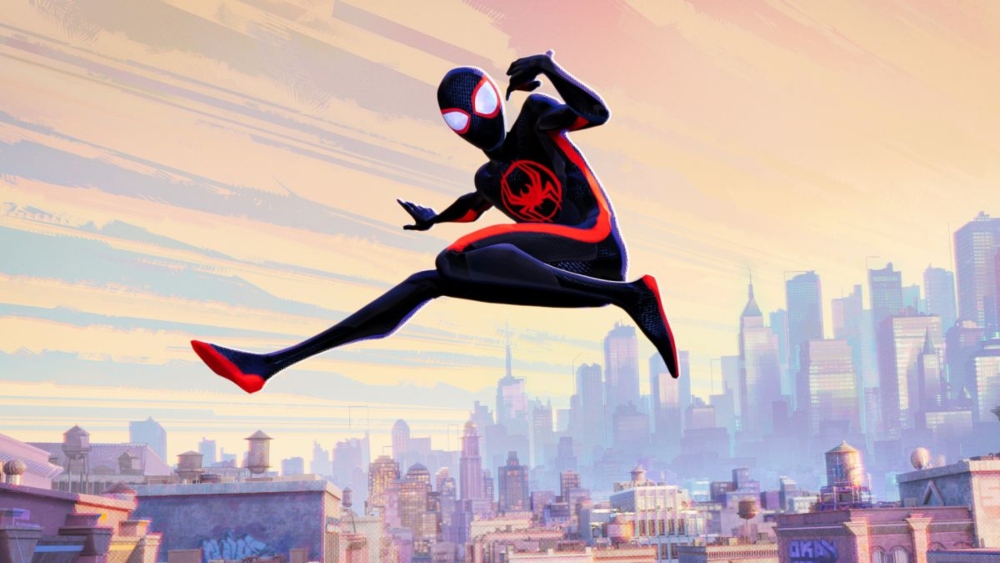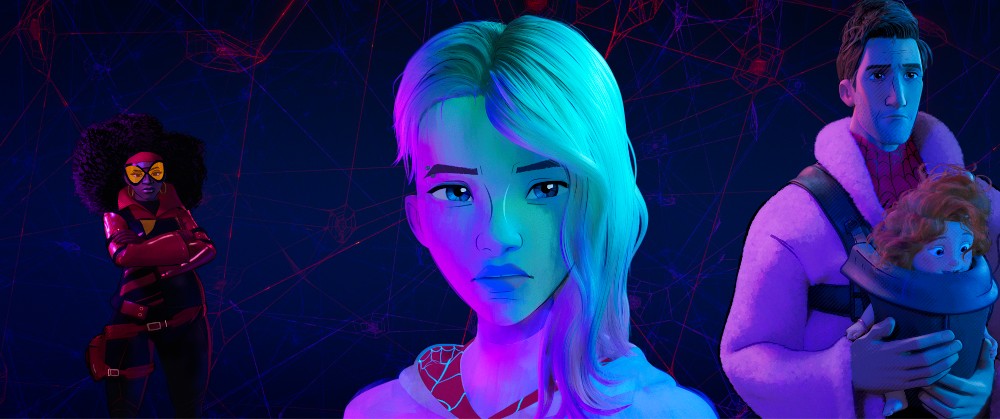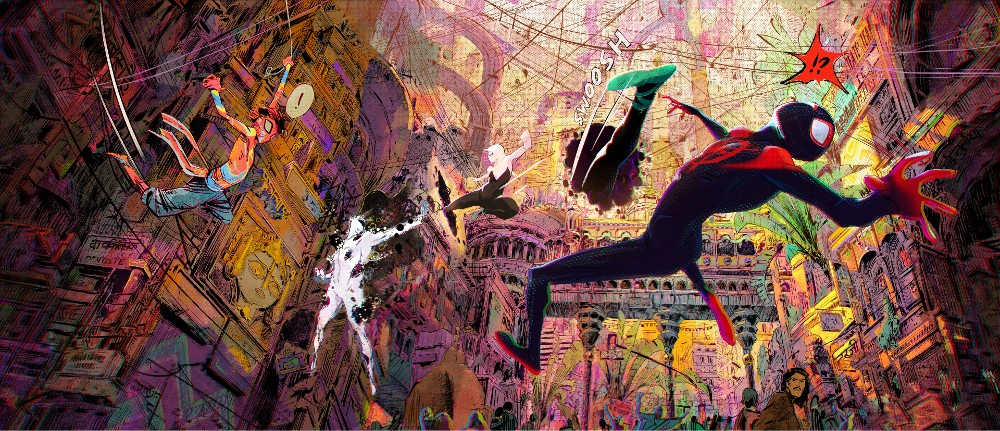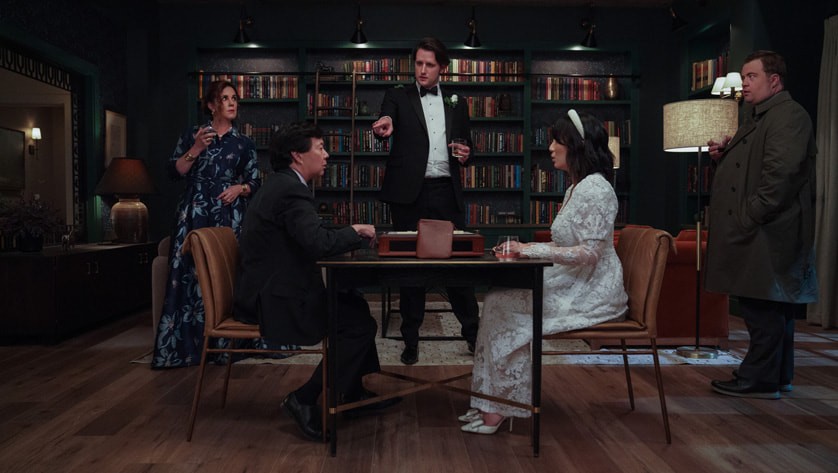
While Composer Daniel Pemberton has become one of the most in-demand collaborators for filmmakers, such as Aaron Sorkin, Danny Boyle, and Edward Norton, his scores for animated films like Spider-Man: Into the Spider-Verse and The Bad Guys have gotten a lot more notice in recent years.
His score for Spider-Man: Across the Spider-Verse is next level, as new characters are introduced to interact with Miles Morales (voiced by Shameik Moore) and Gwen (Hailee Steinfeld), and they learn more about how vast the Spider-Verse really is. Pemberton’s work for the movie spans across musical genres and instrumentation, enhancing the action and the character developments for both Miles and Gwen. And it’s only the first half of a two-part story.
Below the Line spoke with Pemberton again over Zoom a few weeks back, just as Across the Spider-Verse was being released, but we also spoke to him about his work on the second season of the Christopher Miller-led Apple TV+ series, The Afterparty.

BTL: Returning to the Spider-Verse, that’s just a huge project.
Pemberton: And that’s not even the whole score.
BTL: At what point after the first movie comes out, are you told that they’re going to do one or two more movies, and at what point do you start tackling what you want to do in them?
Pemberton: Oh, man. I can’t even remember when we talked about the second one happening after the first one. It’s one of those things that feels like it’s always been happening. It feels like [the second movie has] just been in my life forever. I’ve always been really conscious of the fact that the first one I always felt was such a special project. and such a special film that was so important on so many levels. I kind of felt like it never really got the love it deserved when it came out. When that movie came out, it didn’t do that great at the box office. It did well, but I expected it to be the biggest thing ever. I always used to joke [that] it’s the most unsuccessful Spider Man movie, BUT it was the most loved critically.
I just know from doing it, just telling people, “You gotta go see it,” and they’d be like, “What is it?” I’d be like, “It’s Spider-Man!” and they’d be like, “Oh, yeah, I’ve seen Spider-Man. They bring that out every couple of years.” I’d be like, “No, but this one’s animated,” and they’d be even less interested. Years later, they’d be like, “Oh, my God, I watched it,” and I’m like, “Yeah, I told you to watch it two years ago.” They’re like, “It’s amazing!” and I’m like, “Yeah, I know.” With the film, it’s like a band that has played loads of small venues. Everyone’s seen it in a small venue, and they’re like, “That’s my band,” and now they’re playing a big stadium, and everyone’s like, “Yes!”
BTL: Something that’s been tough to get my head around is that you had three directors on the first movie, and then you have three different directors on the sequel. How did that work?
Pemberton: I think with these movies, everyone is all pushing for the same thing, which is to make the movie as powerful and as groundbreaking and impactful as it can be. Everyone’s working together to get that happening. I’m pushing what I think the best way to go musically is. They’ll be flying in with notes. Everyone’s got ideas on how to do things. I’ve got ideas, they’ve got ideas, and we all work in tandem. It’s a pretty crazy system, but it works.
I think with this film, there’s so much to comprehend. I’m just dealing with the music, and that’s crazy complicated. They’ve got to deal with everything from characters, recording the performances, and the groundbreaking animation. There’s so much stuff that’s so complicated that we don’t think about even just the most basic things of like, “How do you get different character types to interact with each other on screen, and it not look weird?” That was definitely a big challenge of the first and the second movie. If you’ve got two totally different art styles, how do you make sure they can work together on screen? I have the same thing with the music, where I have to create different sonic worlds for each universe, and different themes for each character and different sounds for each character, but they’ve all got to be able to work together when they are together.

BTL: This one seems a bit more rock-based, maybe because we see more of Gwen as a drummer, and there’s that whole band correlation. Did you feel like you could play more in that world than in the first movie?
Pemberton: The first movie is very much centered around Miles. Miles’ sound world is very influenced by the world he’s in, which is very hip hop based, so I wanted to take hip hop elements, and make that a core feature of his sound. Whereas Gwen, that’s not her world. She’s in a band, in a more indie pop synthy kind of world. Punk’s in a punk – that’s pretty much straightforward. 2099’s world is very futuristic, very technological, aggressive, muscular, and that’s got a different sound, so every world has its own sound. In the second film, there’s all these different universes, which we don’t really see in the first film.
BTL: When you knew that there was going to be a second film, what was your first step?
Pemberton: I read the script, and the script is always tweaking and changing all the way through this process, right up to the very end, because they’re perfectionists, and they want to [do] anything they can do to improve it, and they’ll just keep going. The first really substantial thing I had [was that] I came over to LA, and they did a big presentation of all the characters, all the worlds, all the art styles, and just showing me how each of these characters had their own universe and their own style. That was really helpful for me as a composer, because I’m trying to do the same with the music. I’m trying to make each universe sound and feel a bit different, so the way I construct that, and the palette of sounds I use, has to feel special. Gwen’s universe is very dreamy, and it’s got that beautiful watercolor feel, so I’m trying to replicate that in her sound. Whereas 2099’s world is a lot more angular and harsh, so the music has a harsher vibe there.
BTL: At this presentation, did they have enough concept art, so that you could get some idea what was happening?
Pemberton: This film is so deep in concept art, because you’ve got these amazing artists who can just whip stuff up. They’ll just do it in a meeting when they’re bored. They’d just be doodling. If I’m doodling, it’s just a bunch of swirls, and they’ll be drawing something amazing. It’s really useful, because often on films, you see concept art and then you see the final film when they don’t look anything alike. In this, because it is all drawn, the concept art is a big part of the film. There’s stuff they showed me that didn’t end up in the movie, which hopefully will turn up in another film, because there were a few places I was like, “Oh man, that is such a cool universe.” But no one’s seen it yet.

BTL: You’ve been doing these Into the Spider-Verse concerts. Maybe they need to do an art gallery thing where they show some of this concept art. I’m sure people would love to see it.
Pemberton: Yeah, they would. It’s cool. The other thing I like about this movie is the fact it is about creativity, and I think it inspires so many people, just when you see all these different forms of creativity on display, even the LEGO bit. I didn’t even know the LEGO bit was made by a 14-year-old. There’s this kid, who’s amazing, who has been doing LEGO Spider-Man, and he’s brilliant, and I heard that he’s done that sequence in the movie.
BTL: That’s amazing. When you have these new characters, do any of the themes come easier than others?
Pemberton: 2099’s [theme] came quite early on. I felt most solid about that one, and we tried to make sure we started getting that in the trailers early on. That was just getting this crazy sound that worked, and then just tinkering with that, and then suddenly, I’ve got this little riff. It’s one of the first things that I played.
I did a very early concept piece on 2099, a long piece and a lot of it’s not in the movie, but you hear it when he first arrives. They used the beginning of it when he first arrives. I’d say Gwen’s [theme] took a while. I had Gwen’s track, but I never had the melody, and then suddenly, we found this sound, and we were like, “Oh, just a little tweak on that, and that’s it.” It had this balletic quality to it and a gracefulness that she’s got, but also had the synthy, dreamy feel that her world needs.
BTL: You say that 2099’s theme came quickly, but I would think that would be a difficult one, since he has this multi-ethnic background. He’s also from the future, which they don’t get into much. When Spider-Man 2099 was introduced in the comics in 1999, it was a big deal, because it was 100 years into the future, but the movie doesn’t get into that much.
Pemberton: There’s a whole backstory to his world that’s a very modern Mexico. We did try stuff that was more Mexican-influenced, but it didn’t feel right. I’d totally forgotten about that. There’s so much stuff I wrote for this film that’s in the bin. Some of it should stay in the bin, because it wasn’t very good. There are some other bits where you’re like, “Oh, yeah, I forgot about that. That was quite an interesting idea.”
We spent a really long time trying to make electronic versions of classic Mexican percussion, like guiros and shakers and timbales, and it didn’t sound very good. I never cracked it. It is one of these things where I’ve got this great idea, and sometimes you crack these great ideas, and sometimes you’re like, “Nah, that’s better off not being heard by anyone.”
BTL: Do you do a lot of recording at your own home studio before going into the recording studio with the full orchestra?
Pemberton: Every film is a bit different. I’m a pretty rubbish guitar player anyway. I laid down a lot of the punk and the guitar riffs, but then I’ll get someone else to play them, because they’ll do them a lot better. On some scores, I do a lot of stuff here, but on this one, not so much. With this one, there were a lot of synth jams and synth experiments to find noises. We’d jam around on the synth for ages, and then we might find one noise, like the Go-Home-Machine has this really crunchy mad sound, which is off a CS80, which most people know as the Vangelis synth that he played Blade Runner on. I just got one of those and jammed around on that for ages and [got] loads of stuff that’s no use, and you might get one weird thing and you’re like, “That is a cool sound.” So then build that into an electronic instrument and then you can utilize that in the score.
I took stuff from everywhere on this. I’ve done a bunch of sessions with other people with synthesizers. I did some whistling. I was in a graveyard in Peckham in London, and there’s this beautiful old, almost Victorian graveyard that’s huge and overrun and all decayed. It’s got all these beautiful old tombstones and mausoleums. There’s one mausoleum that was higher than a person, but quite small, all stone, and had a metal grill, and it had this most amazing reverb in it. Whenever I find things with amazing reverbs, I’m like, “Okay, I’ve gotta record something,” so I just stuck my recorder in and just whistled into it, like [whistles]. It had this crazy reverb, and it’s so cool. So I just thought, “Okay, we’ve gotta record that,” so I recorded a bunch of whistling, sampled that up, and then that becomes the sound of the anomaly in the train chase and the alternate universe we might discover at the end. All that whistling was originally recorded in a graveyard in Peckham, South London. And then there’ll be stuff that’s recorded at Abbey Road with a massive orchestra or Air Studios. In the same way that the film takes so many different art styles and influences, I’m trying to do the same with the music.
BTL: Did you ever get to see Mark Ronson’s show about recording? [Note: Watch the Sound also streams on Apple TV+.] It had a pretty cool episode about reverbs, where he visited all sorts of spaces like the one you mentioned.
Pemberton: I haven’t actually seen that show, but a lot people tell me it’s really good. Reverb is a big thing. I like tinny, spring reverbs on electronics, because they really make everything feel a bit more metallic. I like dreamy reverbs for Gwen’s world. Punk’s world, reverbs are very short. I could talk very long and boringly about reverb if you want, but I don’t think everyone would be super into it.
BTL: You never know. As a sound engineer myself, I can talk about reverbs all day, and maybe some of our readers would be interested.
Pemberton: I’ll watch a film, and I’ll always be pulling it apart, like I remember going to see Tenet at the IMAX in London, and there’s a scene where they’ve got the big fire engine chase, and Ludwig [Göransson] had done this really cool piece of scoring where he’d side-chained the orchestra. Side-chaining is when you assign a noise to change the compression, so if you have a compression, it’s like WAAAAAH, and if there’s something that’s making it go WAH WAH WAH.
People do it in house music a lot to make it more punchy, but no one’s really done it in film. I always wanted to do in film first; I never managed to pull it off very well, and then Ludwig does it in Tenet, I’m like, “F**k, this sounded great.” The same way we tried to do in Spidey where we were scratching the orchestra on the turntables. I love it when you get things that you feel you haven’t really heard before in the cinema, and I think that makes it a bit more exciting.
BTL: You’ve been jumping back and forth between animation and live action, between TV and movies. Is animation a different challenge than live action
Pemberton: Every film is its own challenge, even Spidey. The first Spider-Verse felt relatively straightforward; this one was not straightforward. This was crazy intense, so every film is a little bit different, and every project is different. For me, it’s really [about whether] that film or project [has] space for me to be a bit more individualistic, and try and do something of me, rather than something of a genre or an industry?
There [have] been a lot of films where you see the poster, and you know what It’s gonna sound like, before you go and see the movie. I prefer to do movies where you look at the poster, and you have no idea what it’s gonna sound like. Or when you get in there, you’re like, “Wow, this is not what I expected.”

BTL: When we spoke last year, you mentioned that for The Afterparty, you were writing a lot of music in advance that they were playing on set to get them in the mood for the different tones. Can you do that for animation?
Pemberton: I’d say on Spidey, there’s a bit of that. The last film I did, which was The Bad Guys, there’s a lot of that. I would write cues or a track, the editor might cut to it, and then I’d rescore it. Sometimes they’d just send me a scene, and I’ll work on it. Every film’s got a different rhythm and a different vibe of how the workflow happens. You just gotta be adaptable all the time as a composer.
BTL: The second season of Afterparty doesn’t come out until next week. Is there anything you can tease? I know you didn’t write the songs for the first season, but were you able to jump into that a little bit more?
Pemberton: The songs for the last one, I produced those, which was really fun, because it was like, “Okay, we just gotta make these banging, but also kind of funny.” Even for the Three Dogs [from Stardom], it was really fun writing a string part for that, and making it feel emotional. This new one, there are even more genres. I’ve done the new one with another composer, called David Schweitzer, because I was deep in Spider-Verse, so I was like, “I cannot do another full series of Afterparty,” because Afterparty is crazy. You’re scoring like 10 movies, plus another movie on top, which is the world of the Afterparty.
I’ve done the main Afterparty world, and I’ve done a couple of the genres, and then David’s done a bunch of genres. He’s done great work on it. The favorite genre I got to play with is… I can’t talk too much about what’s in it… but It’s basically like Basic Instinct, Body Heat episode. No one is doing ’90s erotic thrillers anymore, and those two scores, Basic Instinct and Body Heat, they’re great scores. You can’t really get away with that now – it would feel too cheesy, so It’s fun to just be like, “Okay, I can play in this sandpit for a little bit.”
BTL: I’ve known Phil and Chris for some time, but do they write song lyrics as a part of their thing?
Pemberton: Yes, and no. They’ll kind of throw ideas in, but often, they’re getting other people. They’ll say, “This is the idea of the song,” and it comes together that way.
BTL: You’ve been doing these Spider-Verse concerts. Do you usually come out for these? Are you conducting them or involved with the live shows at all?
Pemberton: They’re doing so many. We’ve done one so far in Brooklyn, and there’s no way I can go on tour, because I gotta write music. I’m going to try and come to a couple of the big ones, because there’s going to be a touring thing, which is a bit more stripped down. And then, every now and again, there’ll be a big one, I’ll try and come to some of those.
Putting on those shows is crazy. The thing I feel cool about that show is we’ve got a scratch DJ, and we’ve got an orchestra. I’m hoping the first time some people have seen an orchestra and a first time some other people have seen a scratch DJ. I think both of those are fascinating cultural art forms, and it’s great to expose as many people to both of them as you can.
BTL: I missed the Kings Theater performance. I only knew about it, because I saw Dan Slott posting pictures from it.
Pemberton: That concert was crazy. I was like, “We have to do the first one in Brooklyn.” They wanted it to be somewhere else, but I said, “It has to be Brooklyn,” because Brooklyn is Miles’ home.
Spider-Man: Across the Spider-Verse is still playing in theaters across the country and doing quite well. Season 2 of The Afterparty will debut on Apple TV+ on Wednesday, July 12.





